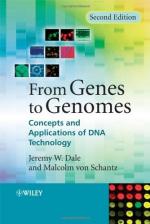|
This section contains 931 words (approx. 4 pages at 300 words per page) |

|
Recombinant DNA refers to a collection of techniques for creating (and analyzing) DNA molecules that contain DNA from two unrelated organisms. One of the DNA molecules is typically a bacterial or viral DNA that is capable of accepting another DNA molecule; this is called a vector DNA. The other DNA molecule is from an organism of interest, which could be anything from a bacterium to a whale, or a human. Combining these two DNA molecules allows for the replication of many copies of a specific DNA. These copies of DNA can be studied in detail, used to produce valuable proteins, or used for gene therapy or other applications.
The development of recombinant DNA tools and techniques in the early 1970s led to much concern about developing genetically modified organisms with unanticipated and potentially dangerous properties. This concern led to a proposal for a voluntary moratorium on...
|
This section contains 931 words (approx. 4 pages at 300 words per page) |

|


